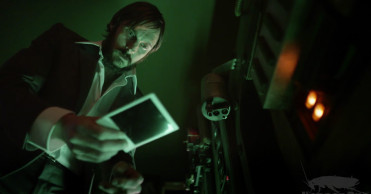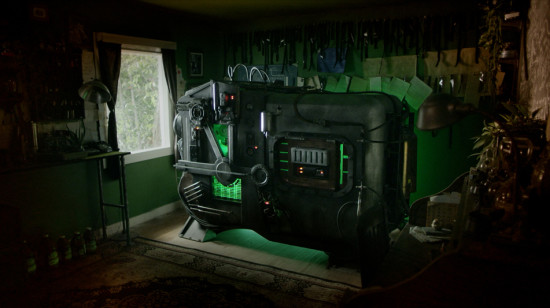I think I’m a good person. I’d like to believe I’m always trying to look out for the needs of those around me. However, I can’t guarantee that I wouldn’t use extraordinary events to better my position in life. It’s very cynical of me I know, but then again many filmmakers out there have many of the same beliefs based on the conflicts in many movies we see these days. Bradley King’s full length feature debut, Time Lapse, explores such a scenario.
Of my many shameful film gaps, Primer is one of several time paradox films that I simply just haven’t caught up with yet. I only bring it up now as it seems to be the standard to which all other time paradox movies are compared. Maybe it’s a good thing I’m sitting here talking about Time Lapse and am unable to compare it to a lot of films sitting in my memory bank. It’s speculation on my part, but one thing I’m assuming King’s film has in common with something like Primer is the embrace of what I’m sure was an incredibly low budget.
Time Lapse tells the story of three friends, Callie (Danielle Panabaker), Finn (Matt O’Leary) and Jasper (George Finn) who run an apartment complex. When concern for one of the tenants is raised, they decide to go into his apartment to check on him. Inside the apartment, they find a staggering amount of Polaroid photos stuck to the wall. All of them are taken from a view that looks through their own window into their living room. Equally staggering is the device taking the photos, a massive camera bolted to the floor that is set to take a picture at 8:00 p.m. everyday. The trio quickly realize that the events in the pictures are taking place 24 hours in the future.
Like the characters in the film, I’m sure the first place your mind would go if presented the same information is, “How can I use this to my advantage?” The most common answers probably involve earning money, but how would you use this machine to make money? Time Lapse uses that common endgame to propel the majority of the film, but also explores the search for inspiration as well as the strain of close relationships in troubling circumstances.
The characters in the film each have their own vision for how the machine can benefit their situation, but none agree on when their obsession should reach its natural conclusion. Jasper’s mental stability continuously dwindles as he becomes more paranoid about his sports bookie’s intentions toward his winning streak. Finn finds his inspiration turning against Jasper and Callie (who happens to be dating Finn) has issues of her own. The machine is basically a character, acting like drug that the trio just cannot quit.
The camera itself is kind of interesting in design, though viewers mostly see parts of it and not the device as a whole. The sound of the shutter is startling at first with how abrasive the sound is when it takes a picture. One of the keys to a science fiction/time travel film is having a memorable “time machine” and I think Time Lapse for the most part delivers that. It’s not flashy or all that otherworldly looking when you see it, but it’s effective for this film. If some random old cook had built some super extravagant time machine, this all would have come off so much more silly. This has a very DIY feel which makes everything that happens feel much more grounded.
Where the film struggles is the cast. With a small cast, you have to ask a lot of the actors in the roles and 3/4 of the actors in the film don’t always do the material justice. It’s a bit frustrating because at times everyone is very good, but then there are glimpses where one or all of the actors should have been reined in a bit. Panabaker and Finn (the actor not the character) are probably the two more inconsistent cast members while O’Leary is able to keep it together for the majority of the movie. Jason Spisak makes a few appearances later in the film as Jasper’s bookie Ivan and does a pretty great job at giving the film a “villain.” However one specific moment that Spisak raises his voice I found particularly unintentionally funny.
To close out Time Lapse I will simply say that while I enjoyed the movie as a whole, it did at times feel like I was watching the entirety of a TV miniseries or a really long episode of The Twilight Zone. Not because it’s not fit for the big screen, but just by the way the story unfolds and the use of some of the scene transitions. Other than that Time Lapse has a pretty eerie score, mostly decent acting and a pretty intriguing premise. You gotta respect a filmmaker that sees time travel potential in ancient photography methods. Overall, this one is worth a watch.







